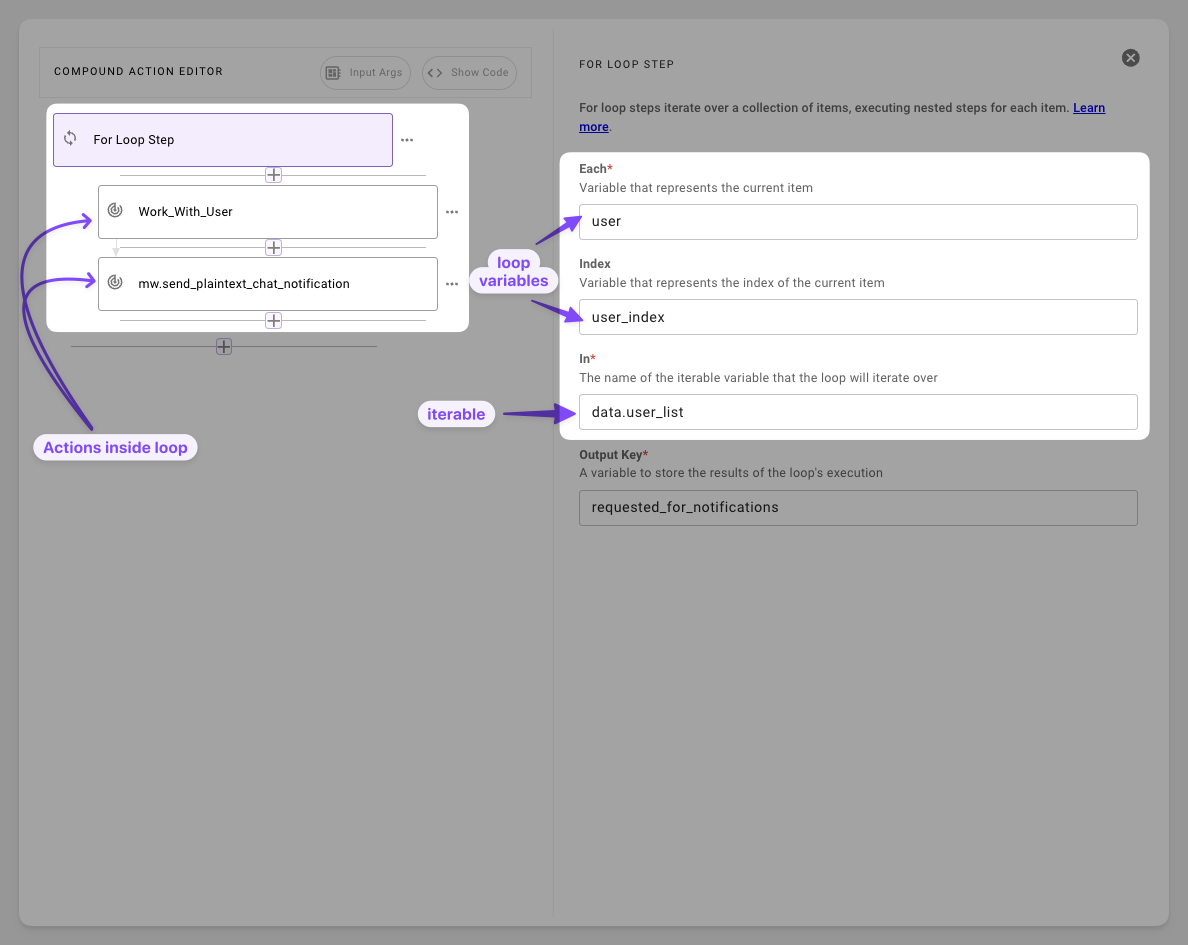For Loop
Overview
The for expression is a foreach loop that iterates over an iterable (array/list from the data bank), binding each item to an each & index variable. It executes steps sequentially per iteration, then aggregate outputs into the output_key as a list of dicts. It is Ideal for bulk actions like user notifications.
Output Aggregation Deep Dive
The for expression outputs a clean list of objects, where one object contains the results of an iteration. An example loop with two actions,
incident_manager_profileandupdated_manager_profile, expect:"for_expression_output_result": [ { "incident_manager_profile": { "id": "12345", "status": "INACTIVE" }, "updated_manager_profile": { "id": "67890", "status": "ON_CALL" } }, { "incident_manager_profile": { "id": "1a2b3c", "status": "INACTIVE" }, "updated_manager_profile": { "id": "4d5e6f", "status": "ON_CALL" } } ]You can access the variables the same way you access any others in the data bank; e.g.,
data.for_expression_output_result[0].incident_manager_profile.statuswill yieldINACTIVE
Low-Code Editor
Add a For Loop Step, bind iterable, define loop variables, and add expressions inside.
You can only bind an iterable in
in, you cannot create a list on the fly using DSL such as["a", "b"], only data bank variables work.You can create a precursor
script actionto output a list and pass it toin.

- Bind the Iterable
(in): Onlydata bankvariables work, inline lists like["a","b"]will fail. - Define
each&index: Seteachfor item (e.g.,user) and index (e.g.,user_index), these are only scoped to the for loop. - Add expression & Set
output_key: Add expressions to each step. Make sure to add readable output keys.
Syntax Reference
Schema
for:
each: ITEM_VAR_NAME* # str: Current item (e.g., 'user')-scoped to steps
index: INDEX_VAR_NAME # str: Optional position (e.g., 'user_index')—use for ordering
in: DATA_BANK_ITERABLE* # str: Ref to array var (e.g., 'data.users')—no inline literals!
output_key: RESULTS_VAR* # str: Aggregates as list[dict] of step outputs
steps: # list: Expressions per iteration (optional, but useful)
- EXPRESSION_1 # e.g., action with {{each.record_id}}
- EXPRESSION_2Fields
| Field | Type | Mandatory | Description |
|---|---|---|---|
each | string | Yes | item binder - accessed as var.prop within steps |
index | string | No | Index binder - provides position (e.g., idx). Useful for ordering or referencing iteration results. |
in | string | Yes | Data bank reference only (upstream outputs) |
output_key | list[dict] | Yes | List of per-iteration dicts: [ {step_key: val}, ... ]. Access: data.results[i].step_key. |
steps | list[expr] | No | Loop body; empty yields empty dicts |
Practical Examples
Example 1: Actions in Batch
Run actions for each user in a list
Compound Action
steps:
- action:
action_name: mw.batch_get_users_by_email
output_key: user_results
input_args:
user_emails:
- '"[email protected]"'
- '"[email protected]"'
- '"[email protected]"'
- for:
each: user
index: user_index
in: data.user_results.user_records # From upstream fetch
output_key: requested_for_notifications
steps:
- action:
action_name: mw.send_plaintext_chat_notification
output_key: notification_output
input_args:
user_record_id: user.lookup_id
message: '''Hi, this is a batch message!'''Expected Output
requested_for_notifications: [
{ "notification_output": { "status": "sent", "user": "user1" } },
{ "notification_output": { "status": "sent", "user": "user2" } },
{ "notification_output": { "status": "sent", "user": "user3" } }
]The compound actions fetches the records of the users and consequentially uses a for loop to send a message to each user.
Example 2: Outage Ticket Processing
Batch-update manager for open tickets
Sample input argument
outage_tickets: [ {"system_id": "OUT-123"}, {"system_id": "OUT-456"} ]Compound Action
for:
each: ticket
index: index
in: data.outage_tickets
output_key: outage_ticket_process_results
steps:
- action:
action_name: get_incident_manager_for_outage
input_args:
outage_id: ticket.system_id
output_key: incident_manager_profile
- action:
action_name: update_incident_manager_profile
input_args:
manager_id: data.incident_manager_profile.id
status: '''ON_CALL'''
output_key: updated_manager_profileExpected Output
outage_ticket_process_results: [
{
"incident_manager_profile": { "id": "7bd99d76-...", "status": "INACTIVE" },
"updated_manager_profile": { "id": "7bd99d76-...", "status": "ON_CALL" }
},
{
"incident_manager_profile": { "id": "839b82da-...", "status": "INACTIVE" },
"updated_manager_profile": { "id": "839b82da-...", "status": "ON_CALL" }
}
]The for loop iterates through each ticket, it finds the incident manager for the ticket and updates the status of the incident manager to ON_CALL
Updated 3 days ago